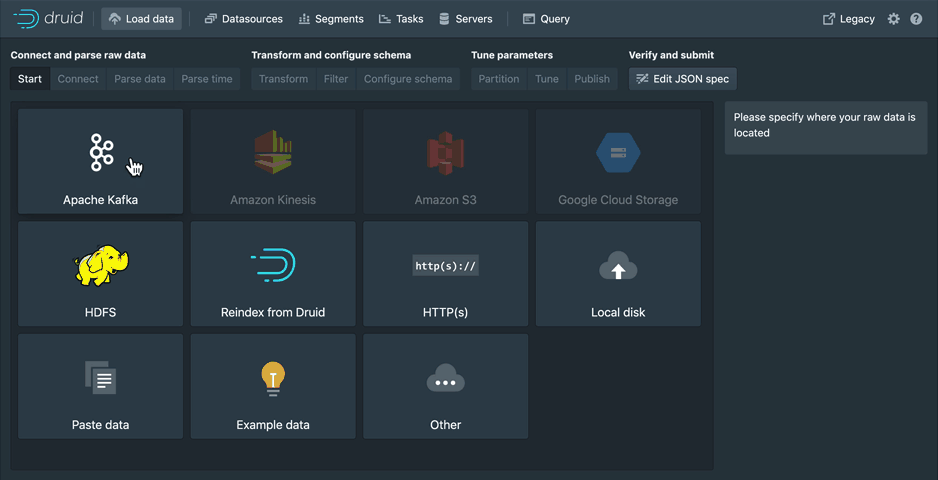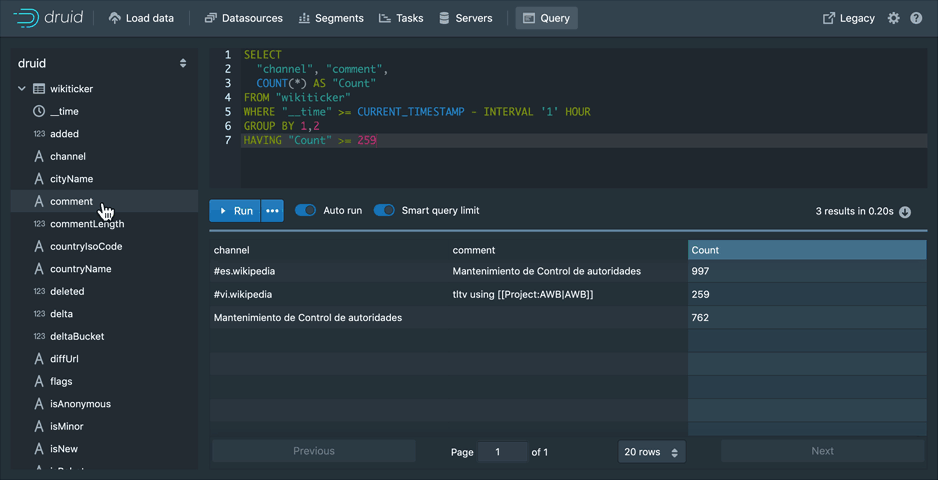* Parallel indexing single dim partitions Implements single dimension range partitioning for native parallel batch indexing as described in #8769. This initial version requires the druid-datasketches extension to be loaded. The algorithm has 5 phases that are orchestrated by the supervisor in `ParallelIndexSupervisorTask#runRangePartitionMultiPhaseParallel()`. These phases and the main classes involved are described below: 1) In parallel, determine the distribution of dimension values for each input source split. `PartialDimensionDistributionTask` uses `StringSketch` to generate the approximate distribution of dimension values for each input source split. If the rows are ungrouped, `PartialDimensionDistributionTask.UngroupedRowDimensionValueFilter` uses a Bloom filter to skip rows that would be grouped. The final distribution is sent back to the supervisor via `DimensionDistributionReport`. 2) The range partitions are determined. In `ParallelIndexSupervisorTask#determineAllRangePartitions()`, the supervisor uses `StringSketchMerger` to merge the individual `StringSketch`es created in the preceding phase. The merged sketch is then used to create the range partitions. 3) In parallel, generate partial range-partitioned segments. `PartialRangeSegmentGenerateTask` uses the range partitions determined in the preceding phase and `RangePartitionCachingLocalSegmentAllocator` to generate `SingleDimensionShardSpec`s. The partition information is sent back to the supervisor via `GeneratedGenericPartitionsReport`. 4) The partial range segments are grouped. In `ParallelIndexSupervisorTask#groupGenericPartitionLocationsPerPartition()`, the supervisor creates the `PartialGenericSegmentMergeIOConfig`s necessary for the next phase. 5) In parallel, merge partial range-partitioned segments. `PartialGenericSegmentMergeTask` uses `GenericPartitionLocation` to retrieve the partial range-partitioned segments generated earlier and then merges and publishes them. * Fix dependencies & forbidden apis * Fixes for integration test * Address review comments * Fix docs, strict compile, sketch check, rollup check * Fix first shard spec, partition serde, single subtask * Fix first partition check in test * Misc rewording/refactoring to address code review * Fix doc link * Split batch index integration test * Do not run parallel-batch-index twice * Adjust last partition * Split ITParallelIndexTest to reduce runtime * Rename test class * Allow null values in range partitions * Indicate which phase failed * Improve asserts in tests |
||
|---|---|---|
| .github | ||
| .idea | ||
| benchmarks | ||
| cloud | ||
| codestyle | ||
| core | ||
| dev | ||
| distribution | ||
| docs | ||
| examples | ||
| extendedset | ||
| extensions-contrib | ||
| extensions-core | ||
| hll | ||
| indexing-hadoop | ||
| indexing-service | ||
| integration-tests | ||
| licenses | ||
| processing | ||
| publications | ||
| server | ||
| services | ||
| sql | ||
| web-console | ||
| website | ||
| .codecov.yml | ||
| .dockerignore | ||
| .gitignore | ||
| .lgtm.yml | ||
| .travis.yml | ||
| CONTRIBUTING.md | ||
| DISCLAIMER | ||
| LABELS | ||
| LICENSE | ||
| NOTICE | ||
| README.md | ||
| README.template | ||
| licenses.yaml | ||
| owasp-dependency-check-suppressions.xml | ||
| pom.xml | ||
| upload.sh | ||
README.md
Website | Documentation | Developer Mailing List | User Mailing List | Slack | Twitter | Download
Apache Druid (incubating)
Apache Druid (incubating) is a high performance real-time analytics database.
Druid is a next-gen open source alternative to analytical databases such as Vertica, Greenplum, and Exadata, and data warehouses such as Snowflake, BigQuery, and Redshift.
Getting started
You can get started with Druid with our quickstart.
Druid provides a rich set of APIs (via HTTP and JDBC) for loading, managing, and querying your data. You can also interact with Druid via the built-in console (shown below).
Load data
Load streaming and batch data using a point-and-click wizard to guide you through ingestion setup. Monitor one off tasks and ingestion supervisors.
Manage the cluster
Manage your cluster with ease. Get a view of your datasources, segments, ingestion tasks, and servers from one convenient location. All powered by SQL systems tables allowing you to see the underlying query for each view.
Issue queries
Use the built-in query workbench to prototype DruidSQL and native queries or connect one of the many tools that help you make the most out of Druid.
Documentation
You can find the documentation for the latest Druid release on the project website.
If you would like to contribute documentation, please do so under
/docs in this repository and submit a pull request.
Community
Community support is available on the druid-user mailing list, which is hosted at Google Groups.
Development discussions occur on dev@druid.apache.org, which you can subscribe to by emailing dev-subscribe@druid.apache.org.
Chat with Druid committers and users in real-time on the #druid channel in the Apache Slack team. Please use this invitation link to join the ASF Slack, and once joined, go into the #druid channel.
Building from source
Please note that JDK 8 is required to build Druid.
For instructions on building Druid from source, see docs/development/build.md
Contributing
Please follow the community guidelines for contributing.
License
Disclaimer: Apache Druid is an effort undergoing incubation at The Apache Software Foundation (ASF), sponsored by the Apache Incubator. Incubation is required of all newly accepted projects until a further review indicates that the infrastructure, communications, and decision making process have stabilized in a manner consistent with other successful ASF projects. While incubation status is not necessarily a reflection of the completeness or stability of the code, it does indicate that the project has yet to be fully endorsed by the ASF.






